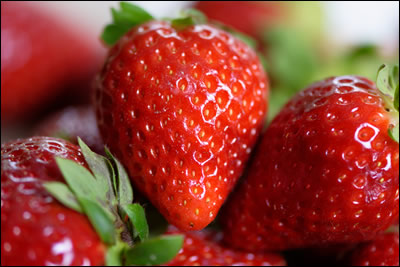Should I Worry About Sugar in Fruit?

While it's true that fruit contains sugar, and some types of fruit contain more than others, eating whole fruit is significantly different from eating a mars bar or drinking a caramel frappuccino.
Fresh fruit offers so much more than the natural sugar it contains, including water, vitamins, minerals, fibre and phytonutrients. Phytonutrients are naturally occurring plant compounds that have wide ranging beneficial effects on the body. Where else can you get a package like that for about 75 calories per serving?
Loaded With Sugar?
The idea that fruit is "loaded with sugar or carbohydrates" needs to be put into perspective. It's true that when you eat fruit, the overwhelming majority of the calories you consume are carbohydrates, mostly in the form of fructose, which is the natural sugar in fruit.
But that's the nature not just of fruit, but of all plant foods. They're predominantly carbohydrate – and that means not just natural sugars, but healthy starches as well as structural elements, like cellulose, that provide fibre. When you eat vegetables, the majority of the calories you're eating come from carbohydrate, too. But you don't hear people complaining that vegetables are "loaded with carbs".
The Other Elements in Fruit
Before dismissing fruit as being loaded with sugar, consider not only the amount of sugar you're eating, but the form that it comes in. There's a big difference between the nutritional value of the natural carbohydrates found in fruits and other plant foods – the sugars, starches and fibres – and what's found (or, more accurately, what's not found) in all the empty calories we eat from added sugars that find their way into everything from brownies to barbecue sauce.
How Much Sugar Exactly?
Faced with a serving of fruit, how much sugar are we talking about, anyway? An average orange has only about 12 grams of natural sugar (about 3 teaspoons) and a cup of strawberries has only about 7 grams – that's less than two teaspoons. And either way, you're also getting 3 grams of fibre, about a full day's worth of vitamin C, healthy antioxidants and some folic acid and potassium to boot. And it'll only cost you about 50 or 60 calories. The fibre actually slows down the metabolism of the sugar and so avoids any kind of sugar spike, as long as the amount of fruit consumed is within reason.
By contrast, a can of cola will set you back about 225 calories and, needless to say, won't be supplying any antioxidants, vitamins, minerals or fibre. You'll just be chugging down some carbonated water, maybe some artificial colour and flavour, and somewhere in the neighborhood of 60 grams of added sugar – about 1/3 of a cup.

